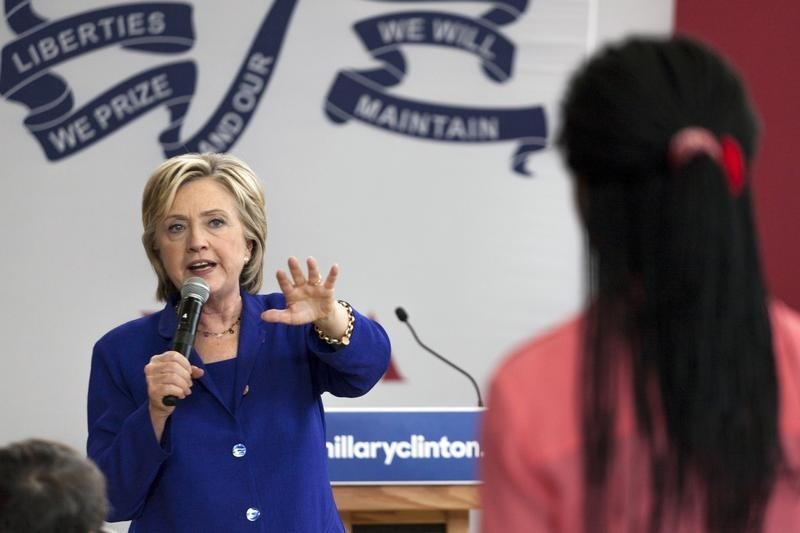By Bill Berkrot
NEW YORK (Reuters) - Hillary Clinton's campaign promise on Tuesday to cap prescription drug costs for U.S. consumers lends weight to efforts by health insurers, doctors' groups and consumers to address skyrocketing prices, industry experts said.
Clinton, in the lead among Democratic presidential candidates, unveiled a plan that includes a $250 monthly cap on out-of-pocket costs prescription drugs, allowing the Medicare plan for the elderly to negotiate drug pricing and permitting Americans to purchase drugs from other countries at lower cost.
In light of massive opposition expected from drug lobbyists and Republican lawmakers, it is uncertain the proposal will ever progress. Clinton is seeking the Democratic nomination for the November 2016 presidential election.
But her campaign trail attack on high drug prices and "excessive profiteering" by drugmakers touched a raw nerve for consumers and makes public anger harder to ignore, policy experts said.
"Once the public gets really pissed, politicians are going to have to have answers and then it gets out of the control of particular lobbyists or companies," said Dr. Ezekiel Emanuel, an oncologist at the University of Pennsylvania School of Medicine and a former adviser to the Obama administration.
A sell-off in drug manufacturer shares on Tuesday reflected expectations that the pharmaceutical industry will be under greater pressure on pricing.
Drug companies routinely raise prices on commonly used medications and are proposing ever higher prices on new therapies approved for the U.S. market.
But companies that manage pharmacy benefits for insurers such as Express Scripts and CVS Health (NYSE:CVS) are demanding more evidence of a drug's efficacy over less expensive treatment options and bigger discounts when two or more medicines offer similar outcomes.
"It's going to take private sector activity" to address the problem of high drug prices, said Ira Loss, pharma and biotech analyst for policy research group Washington Analysis.
In her comments, Clinton focused on the latest example of extreme price hikes. Small biotech Turing Pharmaceuticals raised the cost of Daraprim, an old treatment for a dangerous parasitic infection, to $750 a tablet from $13.50 after acquiring it, the New York Times reported.
ROOM TO NEGOTIATE
As opposition to rising drug prices grows, long-standing reluctance to introduce price controls in the United States is being challenged. Medicare by law cannot negotiate drug prices. But a recent poll found a vast majority of Americans now believe Medicare should be allowed to push for greater discounts.
Drugmakers have insisted that lowering or limiting drug prices will hamper their ability to invest in research and lead to fewer new therapies.
"The proposal released today by the Clinton campaign would do irreparable harm to the nation's health innovation system," Biotechnology Industry Organization CEO Jim Greenwood said in a statement.
The industry estimates it costs between $1 billion and $2 billion to bring a drug to market. Drugmakers also argue that the price of true breakthrough medications should reflect the savings from helping patients avoid the long-term complications of serious illnesses.

"A lot of tremendous hospitalization costs are being displaced by (new) medicines," Pfizer Inc (NYSE:PFE) research chief Mikael Dolsten said.